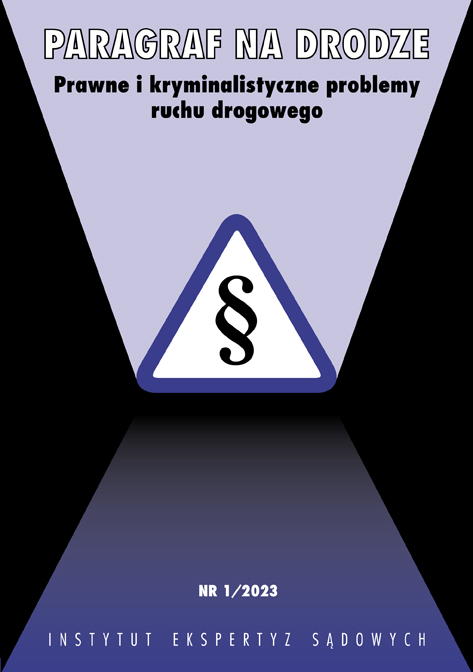

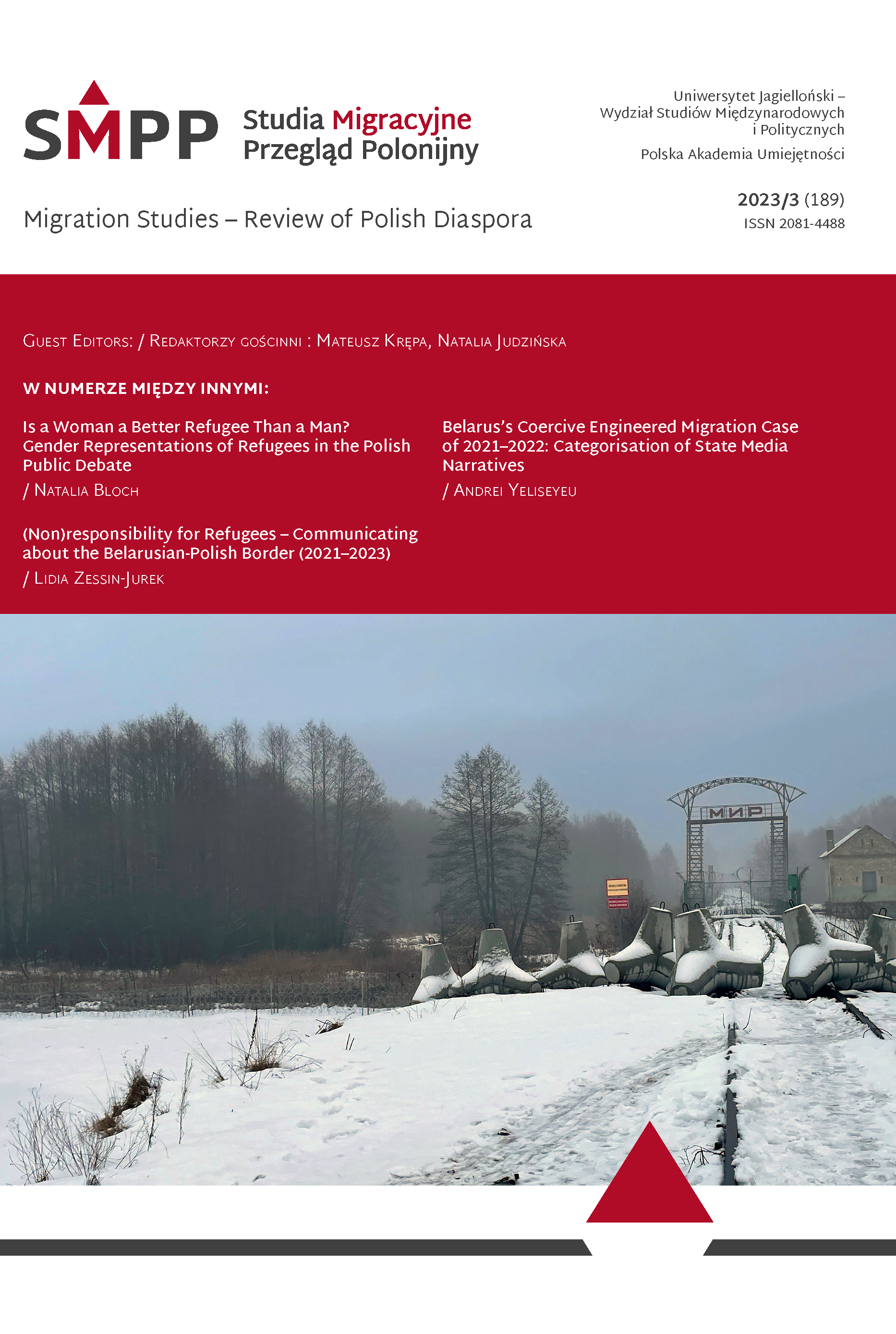
Keywords: Poland; refugees; Polish-Belarusian border; media
Given that two dramatically different refugee regimens have developed along Poland’s eastern border, this essay explores the social conditions and discourses that facilitate such a radically different treatment of people. The Polish state’s violation of human rights on the Belarusian section of the border and the celebration of these rights on its Ukrainian section have become part of media spectacles. This text analyses both the technical and content-related issues of communication about migrants and refugees from the Global South. It includes typologies of attributional biases in the media towards people on the move, discusses their functions and the ways towards a normalisation of violence. The final section historicises the current negative responses to refugees and sets them in the wider context of the uneasy obligations imposed on the “West” by its professed values. In doing so, this essay touches upon questions not only of a sense of social responsibility, but also of actual responsibility for the people who have died in Polish forests and rivers.
More...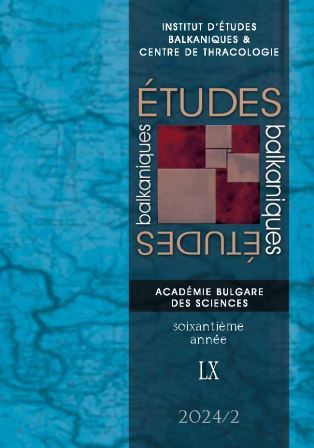

Keywords: content of Études balkaniques; Balkans; Ottoman period
This is an overview of the content of the journal Études balkaniques in the last decade (2014 – 2023) covering the period between the end of the 14th century and the last quarter of the 19th century. The most popular topics that stand out when reviewing it are religious communities and identity issues, urban studies, modernisation. Along with them we observe interest in economy in general, commerce and rural life, international relations.
More...
Keywords: Modern times; The Balkans; content of Études balkaniques
This text presents an overview of the topics dealing with the Modern Balkans in the journal Études balkaniques during the last decade (2014 – 2023). The prevalence of economic and social history as well as urban studies is visible enough. Other well-covered thematic clusters are identities and Otherness, international relations, etc.
More...
Keywords: Cultural Studies; Arts; the Balkans; Études balkaniques
The text summarizes a corpus of articles in the field of Balkan Cultural Studies published in the journal Études balkaniques during the period 2014 – 2023. In view of the plethora of topics and methodological approaches, the review is structured in three main categories covering the following areas: Literature and Cultural Relations, Theatre and Cinema, Visual Culture. The text outlines the general tendencies and contributions observed in the above-mentioned publications.
More...Keywords: Strategic foreign policy of Lithuania; Ukraine and NATO; EU security; president of Lithuania in relations with Poland; policy of Lithuania towards Poland;
Objectives:The aim of this article is to analyse the Lithuanian foreign policy pursued by the President of the Republic of Lithuania, Gitanas Nausda, towards Poland in the years 2019–2023 and to attempt to assess the main directions of its activities in this aspect. Methods:The use of scientific publications, expert reports, official statements, public speeches and previously published interviews in the Lithuanian or foreign press. Results:l. Firstly, the actions of President Nausėda and Duda resulted in the mobilization of other countries to act on behalf of Ukraine and the development of a common position on further actions against the Kremlin in the form of sanctions; 2. Secondly, thanks to the diplomatic means of Nausėda, Lithuania. Poland gradually freed itself from the Russian energy dictatorship, contributing to the political independence of the region; 3. Thirdly, thanks to the same diplomatic measures of Nausėda and Duda, during the NATO summit in Vilnius in 2023, an agreement was reached on the new regional defence plans of the Alliance, fully meeting the expectations of the Baltic states and Poland. Conclusions:The four years of Nausėda's presidency were full of challenges, including: extraordinary circumstances related to the migration crisis as a hybrid attack by the Belarusian regime in 2021, Russian military aggression against Ukraine in 2022 or the energy price crisis in 2021–2022 and the stationing of the Wagner group in Belarus, which prompted Nausėda to look for new directions in Lithuanian foreign policy - which explains the search for a new path with the countries of the region, especially Poland.
More...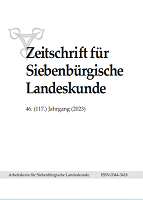
Keywords: conference report; Looking beyond the paradigm; culture; education; ranscultural and transconfessional developments;
Der AKSL Hermannstadt hat diese zum Teil von der Fritz Thyssen Stiftung geförderte Tagung in Kooperation mit dem Institut für deutsche Kultur und Geschichte Südosteuropas (IKGS) an der Ludwig-Maximilians-Universität München, mit der Lutherischen Universität in Budapest und mit dem Budapester Zentrum für Reformationsstudien (Projekt MTA BTK „Lendület Long Reformation in Eastern Europe“) sowie im Kontext der Arbeit des Netzwerks REFORC angeregt und durchgeführt. Ziel war es, die lange tradierten, aber zwischenzeitlich immer stärker an ihre Plausibilitätsgrenzen gelangenden Narrative, die oft noch in den aus dem 19. Jahrhundert stammenden Forschungstraditionen verlaufen sowie meist ethnischen oder konfessionellen Abgrenzungen folgen, kritisch zu überprüfen und aufgrund innovativer Fragen zu korrigieren. Zeitlich lag der Fokus auf der Geschichte der Frühen Neuzeit sowie deren Geschichtsschreibung. Eine hochspannende Tagung mit äußerst anregenden Vorträgen hat an der gastfreundlichen Lutherischen Universität in Budapest stattgefunden. Vier thematische Sektionen (Kontexte; Transkulturelle und transkonfessionelle Entwicklungen; Transnationale und transkonfessionelle Erinnerungskulturen; Kultur und Erziehung bei Protestanten) strukturierten die insgesamt 17 deutsch- oder englischsprachigen Vorträge. Referentinnen und Referenten waren aus acht Ländern, nämlich aus Weißrussland, Deutschland, der Schweiz, Österreich, Tschechien, der Slowakei, Ungarn und Rumänien gekommen.
More...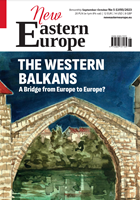
Keywords: Golden Ring; Kremlin; 2023; sarcophagus; Moscow; Putin;
Vladimir Putin’s recent orders to return artefacts to “Golden Ring” cities around Moscow only further reveal the Kremlin’s attempts to tie present issues to the past. Possessing histories stretching back to the time of the Rus’, these cities are once again playing a highly important role in Russian identity.
More...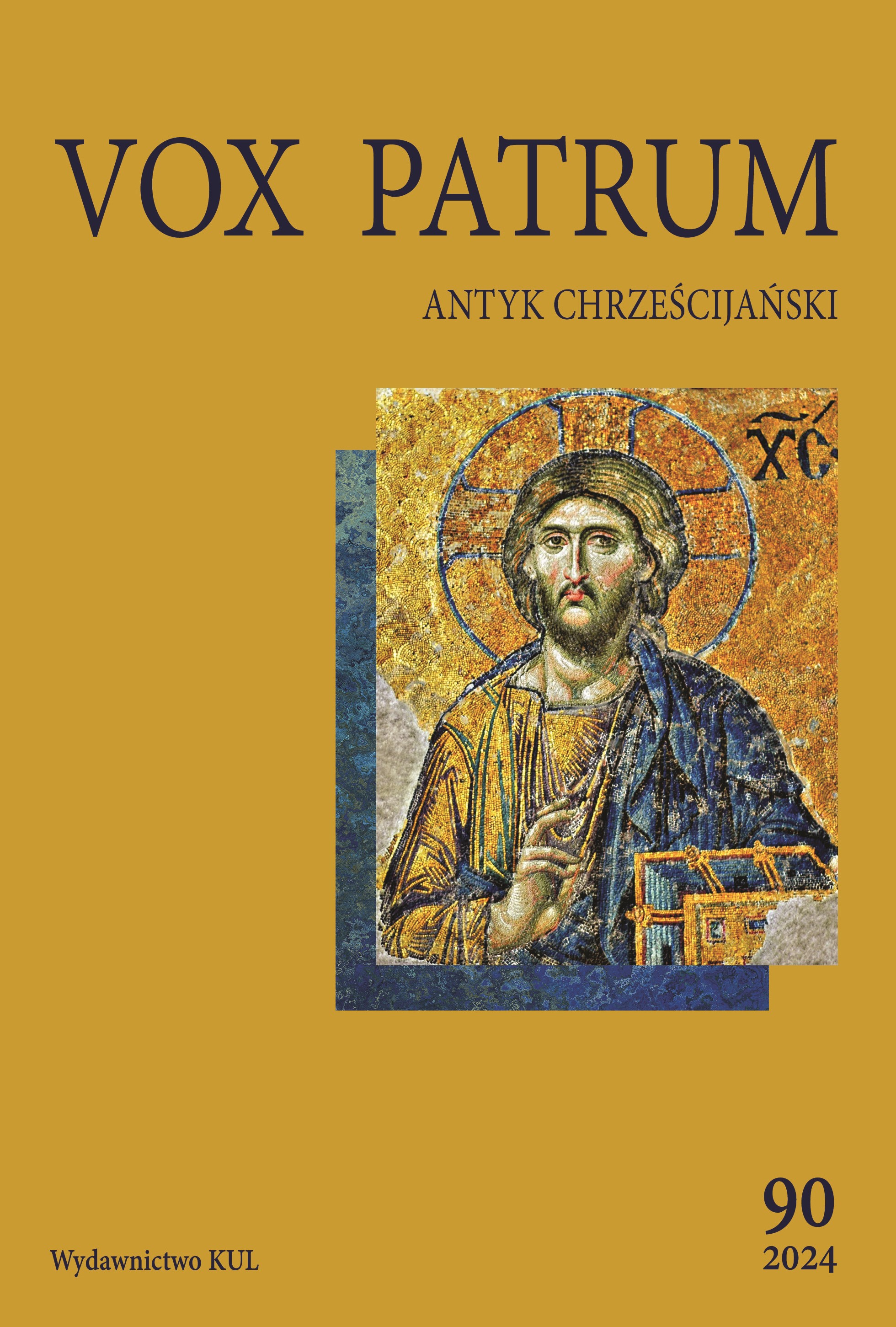
Keywords: bibliography; Christian Antiquity; Patristics; publications; translations; Poland;
Every year Vox Patrum publishes a bibliography of Christian antiquity, presenting the publications of Polish authors from the previous year. The bibliography is divided into 13 thematic categories and the names of the ancient authors to whom the publications refer.
More...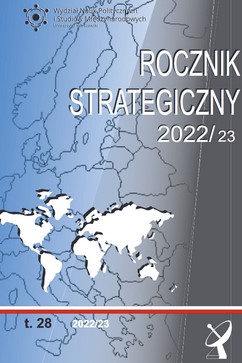
Keywords: world economy; uncertainty; fragmentation; war in Ukraine; inflation; International Monetary Fund; World Trade Organization; free trade and protectionism; Sustainable Development Goals; G-20;
Global economic performance of the year 2022 and early 2023 was overshadowed by the war in Ukraine. Negative economic trends from the previous years in the form of high inflation or disruptions in global supply chains not only continued, but were further reinforced by the ongoing war. Hence, it can be assumed that the global economy is currently heading for an unprecedented confluence of economic, financial, and debt crises. The high level of uncertainty and instability in the world economy has not been conducive to breaking down existing inequalities between and within countries. Moreover, the current situation seems to be fostering a progressive fragmentation of countries in socio-economic terms, with many representatives of the Global South increasingly burdened by the effects of the current economic and social crises. The article analyzes the condition of the world economy over the past year, particularly in the period following the outbreak of the war in Ukraine. Subsequent sections are devoted, respectively, to a review of major macroeconomic indicators in the period, development of world trade, the challenges of managing the world trading system after the Twelfth WTO Ministerial Conference, the situation in international financial markets, the activity of international financial institutions, and the progress – or rather, the lack of it – in implementation of the sustainable development agenda.
More...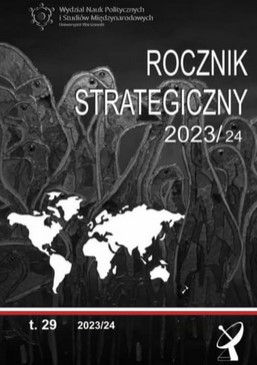
Keywords: Ukraine; Vilnius summit; defense plans; Turkey/Turkiye; Finland; Sweden; military assistance; forward presence; Eastern flank;
The chapter discusses NATO’s functioning in 2023. It begins with an analysis of the Alliance’s strategic environment and trends that were the main factors and drivers of NATO development last year, with special attention given to the war in Ukraine, growing Russian pressure on other states in Europe (i.e. Moldova), as well as internal political processes in member states, particularly Turkey and the USA. The chapter also describes the functioning of NATO in the first half of the year, before its Vilnius summit, analyzing primarily the allies’ efforts in supporting Ukraine in its fight against the Russian aggression, the measures adopted to strengthen NATO deterrence and defense capabilities, as well as the course of the enlargement process and Finland’s accession. The next section is devoted to the Vilnius summit and an analysis of its main results, including the reorganization of NATO-Ukraine relations, updating defense plans of the Alliance, and the progress in talks on Sweden’s accession. The last subchapter presents NATO’s functioning after the Vilnius summit, focusing on the problems in organization of the assistance to Ukraine, further implementation of steps directed to expand NATO deterrence and defense capabilities, but also discussing the developments in NATO operational activities and cooperation with partners. In the concluding part, the chapter offers a short assessment of NATO performance in 2023 and some prognosis of the future evolution of the cooperation within the organization.
More...
Keywords: nuclear weapons; nuclear buildup; missiles; USA; Russia; China; New START; CFE; CTBT; Iran; North Korea;
In 2023 Russia suspended its participation in the New START treaty. This has several implications for international security as another stage in the process of erosion of the arms control legal-institutional architecture. For the first time since the 1980s, no bilateral treaty regulates American and Russian nuclear weapon stockpiles. Since the liberal international order turns towards power politics, both of these nuclear powers might feel enabled to build up their capabilities of this kind without major restrictions. Furthermore, Russia continues undermining international arms control regimes by its withdrawal from the CFE treaty and “de-ratification” of the CTBT treaty. Besides the vertical proliferation, there are also persistent challenges regarding its horizontal dimension, as Iran and North Korea pursue their nuclear programmes. The chapter aims thus to explain the meaning of these developments for international security as well as interpret their main implications.
More...
Keywords: war; intensive armed conflicts; battle-deaths; one-side violence; Russia- -Ukraine war; Israel- Hamas war; war in Sudan; Darfur; war in Yemen; war in Myanmar; Azerbaijan-Armenia war;
The world experienced turbulent changes in armed conflict dynamics in 2023. Some of the intense armed conflicts of the last decade – measured by the number of battle-related fatalities – significantly weakened (Afghanistan, Syria, Ethiopia-Tigray), while others intensified even more (Russia-Ukraine, Yemen, Myanmar), and some broke out, very quickly reaching the level of 1 000 battle-deaths (Israel- Hamas, Sudan). Many regions remained highly unstable, and ongoing high-intensity armed conflicts (i.e. wars) involved numerous non-state actors, including jihadist groups, tribal militias, clans, and warlord groups, which led to their internationalization (Somalia, conflicts in the Sahel region). This chapter aims to select and analyze the dynamics of some of these conflicts in 2023. Given the increase in the number of wars, selecting armed conflicts based on the criteria of their intensity, regional importance, and internationalization becomes more difficult. In this year’s edition, the attention is focused, first, on two wars – in Ukraine and in Gaza – and solely on their military dimension. Secondly, the conflict in Yemen took on a new international context at the end of 2023 due to Houthi attacks outside Yemen (attacks in the Red Sea region). Among numerous African wars, attention is paid to a new conflict in Sudan – the “war of the generals”, which, apart from large-scale military operations, brought mass victims of one-sided violence, including in Darfur. Among the Asian conflicts, the war in Myanmar is selected for analysis since it has been one of the most intensive armed conflicts, and the armed clashes between the junta and rebels have been accompanied by brutal attacks on the civilian population. Finally, the chapter ends with the Nagorno-Karabakh conflict, which was not as intense in 2023 as the other analyzed wars, but Azerbaijan’s military operation brought a turn in the history of this one of the longest conflicts in the post-Soviet space, leading to the capitulation and dissolution of the quasi-state – Republic of Nagorno-Karabakh.
More...
Keywords: World Economy; geoeconomic fragmentation; re-globalization; war in Ukraine; war in Gaza; inflation; sovereign debt; International Monetary Fund; Word Trade Organization; free trade and protectionism;
According to the IMF, after several decades of progressive economic integration, global economy is on the verge of a reverse process of geoeconomic fragmentation. Since the global financial crisis (2007-08), the world economy has been undermined inter alia by Brexit, the U.S.-China trade war, the COVID-19 pandemic and numerous armed conflicts, particularly the wars in Ukraine and Gaza. Simultaneously, over the course of 2023, several multilateral institution voiced opinions that the remedy for international economic turmoil is a return to economic openness – a process referred to as re-globalization. Re-globalization is a concept that focuses on interconnection, cooperation, and trade between countries. It promotes the further integration of global markets and the expansion of global value chains. It can bring a range of benefits to individual countries and their citizens: from accelerating economic growth to improving social and environmental indicators. Looking at the current state of the global economy, taking swift action to improve the situation seems essential. The end of 2023 and the first weeks of 2024 indicate very modest growth prospects. It has also been difficult in the recent months to make progress on the sustainable development agenda. Therefore, subsequent sections of the chapter are devoted, respectively, to the review of major macroeconomic indicators in 2023, development of the world trade, the challenges for governance of the world trading system, condition of international financial markets, reform of international financial institutions, and the situation at the halfway point of the 2030 Agenda.
More...
Keywords: United States; EU; Russia; China; Ukraine; Joe Biden; Donald Trump; election; migration;
“Bringing America together” was the primary focus of Joe Biden’s 2021 inaugural address. Meanwhile, in his third year in office, the internal politics became increasingly strained, with restoring unity remaining a hazy campaign promise. Domestic challenges included numerous disputes in Congress and a legislative gridlock, followed by reciprocal claims of abuses and suspected law violations by the Joe Biden and Donald Trump teams. The lack of consensus has resulted in an overall slowdown and ineffectiveness of political processes. Even the initially undisputed assistance to Ukraine (later also aid to Israel in response to the Hamas attack) became a political obstacle. The US foreign policy, meant to restore US reputation and global credibility, likewise failed to generate spectacular results. The initial mobilization of the US and the West around the Ukrainian crisis has faded. Also, the Ukrainians’ reluctance to push back against Russia fuelled a broader dissatisfaction of the US and its allies. Furthermore, the Hamas attack on Israel, in the second half of the year, and the Israeli retaliation merely worsened the situation in the Middle East. The US relations with China and Russia remained extremely tense. Additionally, strengthening ties between the so-called “rest” countries, marked by the expansion of BRICS, presented an additional challenge to US diplomacy.
More...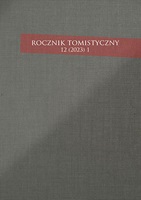
Keywords: conference report; Thomistic Symposium in Łomża; philosophy of religion, theology;
W dniu 8 marca 2023 roku w Wyższym Seminarium Duchownym im. Jana Pawła II w Łomży odbyło się kolejne, już piąte, Sympozjum Tomistyczne. Tegoroczne spotkanie było zatytułowane Tomasz z Akwinu a metafizyka. Organizatorami sympozjum, jak co roku, było Wyższe Seminarium Duchowne w Łomży, Naukowe Towarzystwo Tomistyczne oraz Wydział Filozofii Chrześcijańskiej UKSW.
More...
Keywords: Thomism; Polish Philosophical Congress; Philosophy;
W dniach 11-16 września 2023 roku na Uniwersytecie Łódzkim odbył się XII Polski Zjazd Filozoficzny. Wydarzenie to było organizowane przez Polskie Towarzystwo Filozoficzne, Komitet Nauk Filozoficznych PAN oraz Instytut Filozofii Uniwersytetu Łódzkiego. Tegoroczny zjazd odbywał się z okazji 100. rocznicy I Polskiego Zjazdu Filozoficznego zorganizowanego w 1923 roku na Uniwersytecie Jana Kazimierza we Lwowie. W trakcie zjazdu odbywały się debaty, panele dyskusyjne, wykłady plenarne, sympozja oraz obrady w 23 sekcjach tematycznych.
More...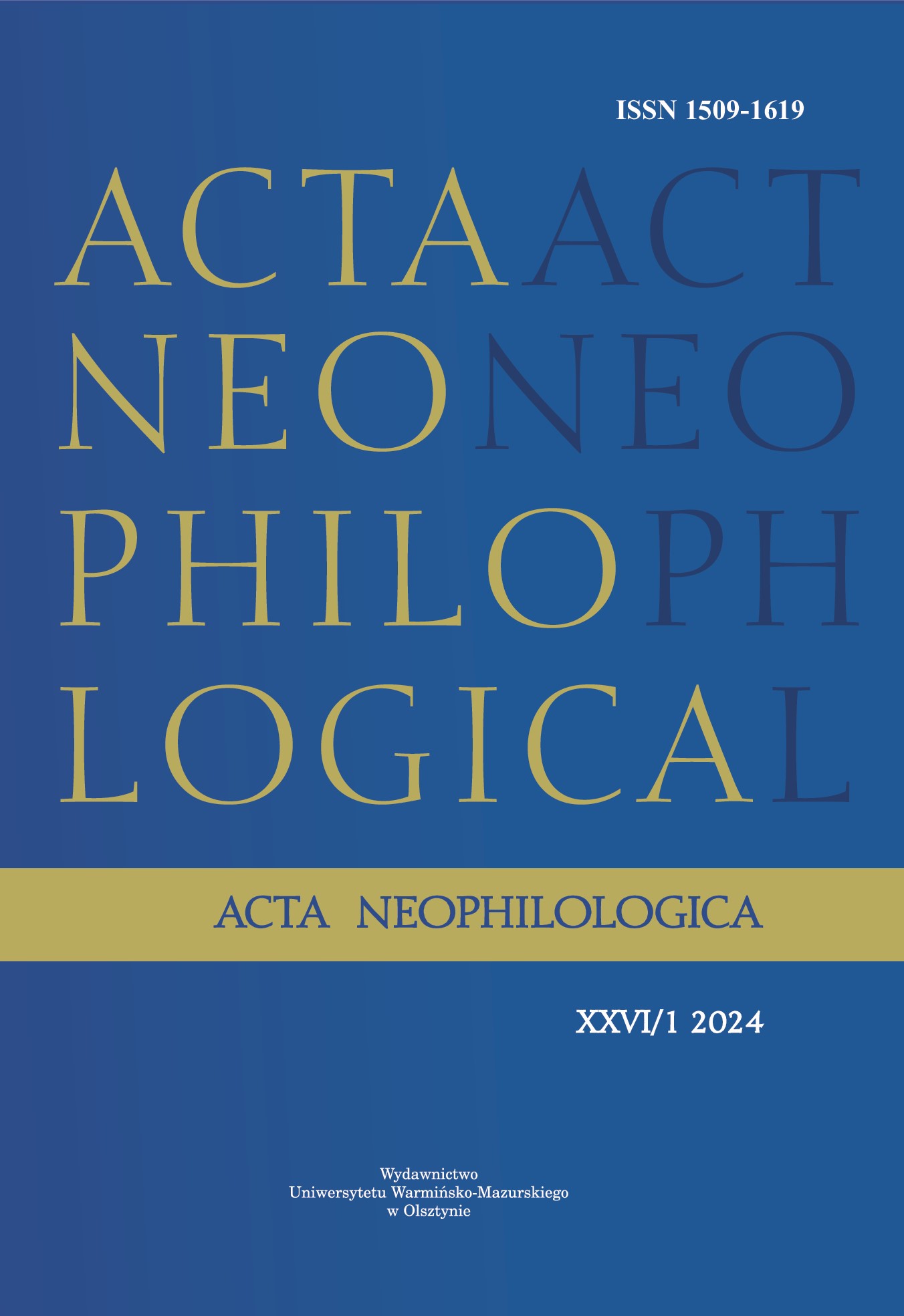
Keywords: book review; the language of social media; communication on the Internet; word formation; contemporary Polish; word formation tendencies;
Review of: Urzędowska, Aleksandra (2023), Facewords. O tendencjach słowotwórczych w mediach społecznościowych. Kraków: Universitas, ss. 260, ISBN 978-83-242-4041-8, ISBN e-book 978-83-63241-09-4.
More...